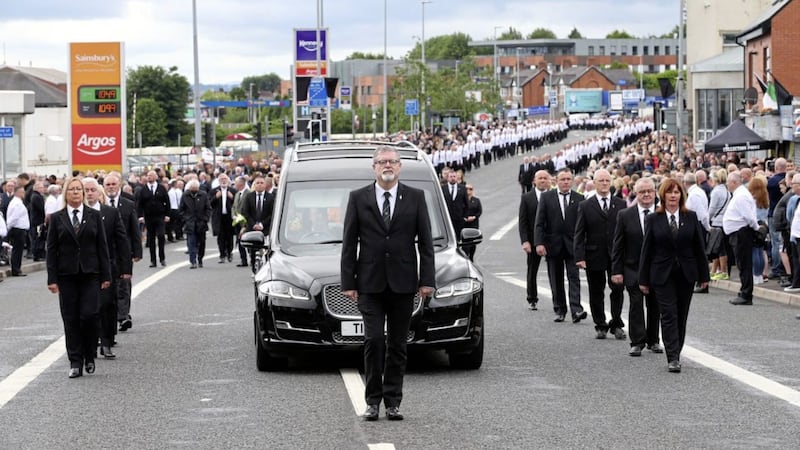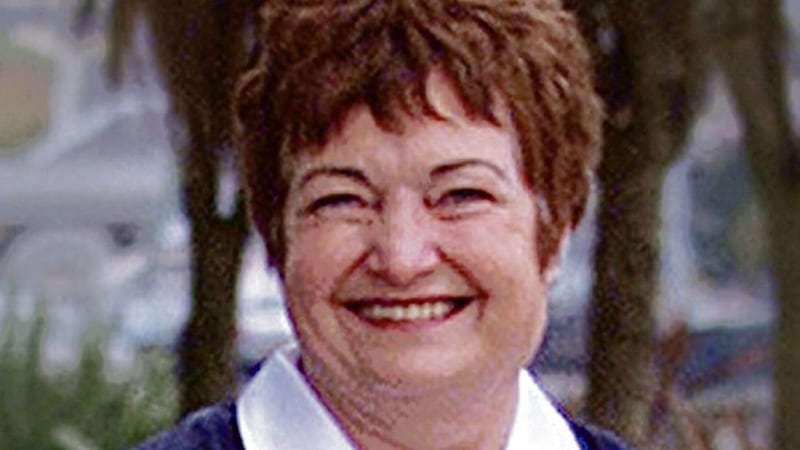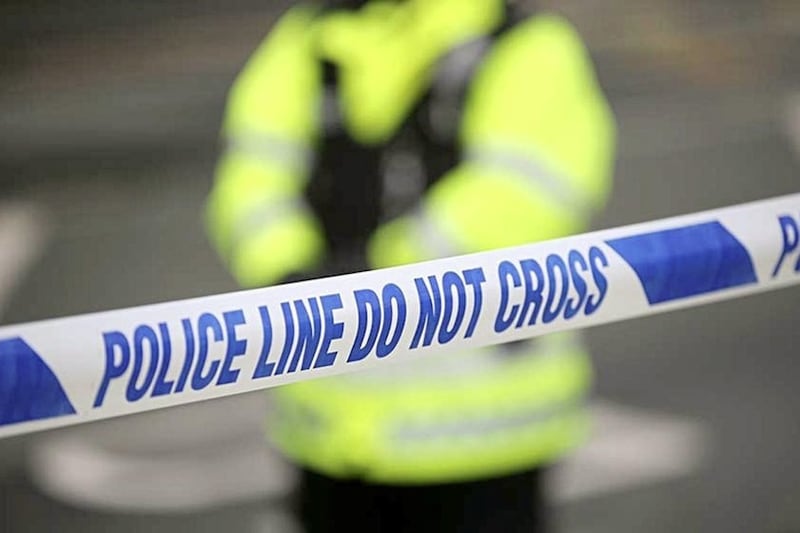A review into the PSNI's handling of the funeral of senior republican Bobby Storey has found no evidence of bias favouring one community over another.
Her Majesty's Inspectorate of Constabulary and Fire & Rescue Services (HMICFRS) said police prioritised public security over enforcement of Covid-19 regulations.
The watchdog reviewed the PSNI's actions surrounding the funeral following the Public Prosecution Service (PPS) decision not to pursue prosecutions over potential breaches of coronavirus regulations.
HMICFRS said it understood why the PSNI took the approach it did, given the likelihood of tensions, and because regulations were confusing.
The funeral saw about 2,000 mourners line the streets in Belfast for Bobby Storey's funeral at a time when strict Covid-19 regulations were in place.
The inspectorate said the PSNI should have explained and encouraged compliance with regulations before the funeral took place, because the service had anticipated that breaches would occur on the day.
HMICFRS also found the PSNI took a consistent approach to investigating alleged breaches at similar funerals or events, and concluded that much of the public criticism of the PSNI following the funeral was unwarranted.
Her Majesty's Inspector of Constabulary Matt Parr said: "The PSNI faced the complex challenge of policing a politically-sensitive funeral while also trying to interpret the confusing Covid-19 regulations. The service took a sensitive approach, and ultimately achieved what it set out to do - prioritising public security over compliance with the regulations.
"Due to the complex and frequently changing Covid-19 regulations, we are not confident that there was enough evidence to prove to a court that any of the attendees at Bobby Storey's funeral had knowingly committed an offence - and we therefore agree with the decision not to prosecute.
"I am reassured that the PSNI showed no bias in its handling of the funeral, and that the service would have taken the same approach if the funeral was held in a different community. The PSNI does however have lessons to learn from its handling of the funeral, and we have therefore made several recommendations to help it improve how it polices events in the future."
PSNI Chief Constable Simon Byrne welcomed the findings of the report.
He said: "The global pandemic has presented insurmountable challenges for policing everywhere. In the context of new and rapidly changing legislation, we have always sought, with the best of intentions, to support our colleagues working in the health sector to protect the community by preventing the spread of the Covid-19 virus.
"We welcome the findings of today's HMICFRS inspection report, both in terms of the assurance it provides to the public, and the learning it identifies for the Police Service. We are committed to impartiality and are pleased that the report concludes that there was no bias in our handling of the funeral, and that the same approach would have been taken if the funeral was held within a different community. Furthermore, the HMICFRS report supports the principle of early engagement recommending that this practice continues.
"We are listening and are determined to work with the entire community to enhance confidence in policing as an impartial and even-handed service working hard to protect our citizens."
Justice Minister Naomi Long said: "The inspectorate did have some criticisms of how the PSNI engaged with the event organisers before, during and after the funeral but emphasised that since these were not especially serious failings, they did not justify individual officers being censured or called upon to resign.
"The report also highlights that all politicians and community leaders have a part to play in working with the police to build and maintain public confidence in policing, and that they should be mindful of the consequences, intended or otherwise, of their comments.
"We have well-established and carefully calibrated arrangements in place for policing oversight and accountability. Those mechanisms are there for a reason. They exist to ensure policing can be held to account when necessary free from any political interference, even when there is a high level of public interest, and that is something which we must all respect."
New UUP leader-elect Doug Beattie said that his party's position remained that the chief constable should resign, but added that he was willing to work with him to "rebuild confidence".
Mr Beattie told the BBC: "He has the ability to build back that confidence and I will work with Simon to do that."
When asked if he was calling for the resignation of the chief constable, Mr Beattie said: "Well, nothing has changed with regard to the Ulster Unionist Party. Our previous party leader called for his resignation and I am now saying I am willing to work with Simon Byrne and if he can build that confidence back again then that is great, then we can move forward into the future.
"Our previous party leader said he should resign and that has not changed, but he can build back that confidence and he can change, anyone can change, and if he does so then the whole situation changes."
PPS directoor Stephen Herron said: "I appreciated the opportunity to engage with HMICFRS inspectors as part of their thorough examination of all relevant matters.
"We particularly welcome the conclusions reached on the transparent approach taken by the PPS to our decision-making in this case and the useful context given to the challenges of enforcing alleged breaches of the criminal law surrounding a sensitive event when faced with complex and rapidly evolving regulations.
"As the internal PPS review process remains ongoing - a process which is independent of the original decision-making process and also of the HMICFRS findings - it would be not be appropriate to comment any further at this stage."
UUP policing spokesperson Mike Nesbitt said: "The reality is there have been no winners from this entire process. I welcome confirmation that the PSNI made mistakes.
"The PSNI clearly have major questions to answer, especially regarding the 'degree of informality' in discussions with funeral organisers.
"Whilst we await the conclusion of the PPS review, it's already clear that the PSNI at senior level must review the nature of the relationship with Sinn Féin."
SDLP Policing Board member Dolores Kelly said the report showed that police were placed in an impossible situation.
She said: "As is often the case, those tasked with managing difficult public order situations have become the focal point for political anger. The failures that day, and since, rest entirely with political leaders.
"There are legitimate concerns about how the PSNI approached the funeral and the initial dialogue with organisers.
"There have been concerns about the policing response throughout the pandemic. I welcome the chief constable's commitment to addressing these issues.
"The rush to recriminate and call for police resignations was a mistake. All parties must commit to working constructively with police to improve outcomes for people."








